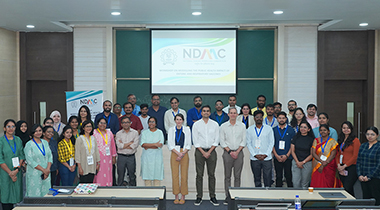
Events
Modeling the Public Health Impact of Enteric and Respiratory Vaccine Workshop
January 9-11, 2025
The Vaccine Preventable Diseases Working Group of NDMC led by Prof Siuli Mukhopadhyay, IIT Bombay organised a workshop on Modeling the Public Health Impact of Enteric and Respiratory Vaccines from 9th-11th January, 2025.
The workshop was attended by 31 participants (17 males; 14 females) from various institutes including, IIT Bombay, Visva Bharati University, Calcutta University, Institute of Chemical Technology, Indian Institute of Public Health-Delhi(IIPH-D), ICMR-National Institute of Epidemiology (ICMR-NIE), SAFETYNET India-National Centre for Disease Control, Vellore Institute of Technology, ICMR-National Centre for Disease Informatics and Research (NCDIR), Ashoka University, St. John’s Research Institute, ICAR-NIVEDI, Koita Center for Digital health, NTAGI Secretariat, Dr. BSA Medical College and Hospital, ABV-Indian Institute of Information Technology and Management and National Institute of Epidemiology.
The workshop commenced with a welcome by Dr. Suchita Nath-Sain followed by an overview lecture by Prof. Benjamin Lopman from Emory University. The morning session led by Prof. Kristin Nelson and Aniruddha Deshpande from Emory University, covered core ID epidemiologic concepts for modeling and Modelling 101(SIR) Simple SIR and SIR + demography. This was followed by an online talk on the Effectiveness and impact of oral rotavirus vaccines in the Universal Immunisation Programme in India by Dr. Venkata Raghava Mohan from CMC Vellore and a hands-on session on design and code a model demo, facilitated by Pragati Prasad from Emory University. Break-out sessions focused on TB, rotavirus, and RSV modeling, followed by an online talk on Burden Estimate of RSV: A study on Children Aged Below 5 Years in India by Prof. Subhra Sankar Dhar from IIT Kanpur. The day concluded with a lecture on the Natural History of TB, rotavirus, and RSV by Dr. Nelson, Dr. Lopman, and Pragati.
The second day opened with an online session by Dr. Jacob John from CMC Vellore on RSV: Building the case for a public health response, followed by break-out exercises on pathogen-specific complexities by the facilitators from Emory university. Dr. Arup Deb Roy, from John Snow India, presented insights into New vaccine introductions under India’s Universal Immunization Programme. Dr. Lopman then led a session on Modelling 202 incorporating vaccination followed by discussions on vaccines for TB, RSV, and rotavirus. Subsequent talks included Understanding transmission dynamics of rotavirus in India by Dr. Esha Kashyap and Shoummo Sengupta from NDMC, IIT Bombay and Immuno-epidemic model with time varying parameters and waning immunity by Prof. Malay Banerjee from IIT Kanpur. The day concluded with lectures on incorporating age structures and contact assumptions and the GlobalMix India by Dr Nelson and Pragati.
The workshop concluded on the third day with a session on Modelling applications for rotavirus/RSV led by Dr. Nelson, Dr. Lopman, and Pragati Prasad.
Overall, the workshop was highly engaging, with more than 80% of respondents in a post-workshop survey finding the coding sessions highly beneficial. One of the participants provided the following feedback:
“The sessions were highly insightful, and some talks were informative and helpful. Since I do not come from a mathematical background, I initially found it challenging to derive equations. However, while writing the codes, I found the process much easier and engaging. Now, I have gained a basic understanding of mathematical modeling. Thanks to the NDMC team for providing this valuable opportunity” Hariprasad, ICAR-NIVEDI.
